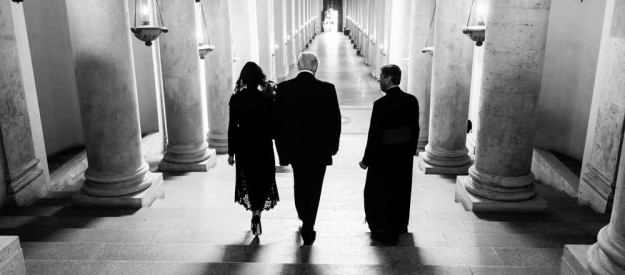"We are losing our attitude of wonder, of contemplation, of listening to creation and thus we no longer manage to interpret within it what Benedict XVI calls 'the rhythm of the love-story between God and man.'"
+ Pope Francis
The pope and the president

Last week’s meeting between Donald Trump and Pope Francis was seen by many as a final chance to impress upon the president the urgency of supporting the 2015 Paris Climate Accord—the historic international agreement to lower emissions of carbon dioxide, among other goals. The president has promised to pull out of the deal. The pope wants the US to remain in it.
The way many in the mainstream media were characterizing the meeting, you’d think this was the first time a pope and a president met among disagreement. But it was only three years ago when President Barack Obama made a similar visit to the papal offices—a visit that highlighted grave differences between that administration and Catholic teachings.
After that 2014 trip, the official Vatican statement politely noted that "there was a discussion on questions of particular relevance for the church... such as the exercise of the rights to religious freedom, life, and conscientious objection, as well as the issue of immigration reform."
Similarly, after the president’s meeting with Rome’s chief diplomat, Cardinal Pietro Parolin, Secretary of State Rex Tillerson politely said that there was “a good exchange” on “the difficulty of addressing climate change, responses to climate change, and ensuring that you still have a thriving economy and you can still offer people jobs so they can feed their families and have a prosperous economy.”
For their part, Vatican officials also expressed cautious optimism after the president left for the Group of 7 summit meeting in Italy over the weekend. And yet as of today there is still no official White House decision on whether or not the President will accept the Paris accord.
Sources in the administration describe internal conversations about Paris as heated. No doubt, Rome's insistence that the US stick to the agreement is a growing factor in discussions in the Oval Office—and elsewhere in the White House.
All of this gets to a point that Pope Francis makes in Laudato Si’, which underscores something more basic about the Church’s understanding of its relation with the state.
“On many concrete questions,” Francis writes, “the Church has no reason to offer a definitive opinion; she knows that honest debate must be encouraged among experts, while respecting divergent views.” But then he continues, stressing the urgency of today’s eco issues:
[W]e need only take a frank look at the facts to see that our common home is falling into serious disrepair. Hope would have us recognize that there is always a way out, that we can always redirect our steps, that we can always do something to solve our problems. Still, we can see signs that things are now reaching a breaking point... (LS 61)
Here we find Pope Francis in firm agreement with Benedict XVI, who wrote this in his first encyclical, Deus Caritas Est:
The Church cannot and must not take upon herself the political battle to bring about the most just society possible. She cannot and must not replace the State. Yet at the same time she cannot and must not remain on the sidelines in the fight for justice. She has to play her part through rational argument and she has to reawaken the spiritual energy without which justice, which always demands sacrifice, cannot prevail and prosper. A just society must be the achievement of politics, not of the Church. Yet the promotion of justice through efforts to bring about openness of mind and will to the demands of the common good is something which concerns the Church deeply. (DCE 28)
While some would argue that the Church should not support particular prudential matters of statesmanship—in this case, the Paris Accord—there is something to be said for urging the nations of the world to act cooperatively to address a known harm. This is why Rome encourages treaties that work toward the respect of human life in all its forms; and that strive toward goals like nuclear disarmament, international rights of workers, and, yes, the means of addressing climate change.
A president’s papal audience is, then, a special time for the Church to publicly seek dialog with the state. But ultimately all the Church can do is offer the truth. It’s up to political leaders to hear it—and for the citizens of the world, Catholic and otherwise, to raise their voices, too, so that our leaders will then act prudentially for the good of all mankind.
In 2014, Barack Obama did not listen to Pope Francis when it came to artificial contraception and religious freedom. Let's hope President Donald Trump doesn't make that mistake.
And on that note, here’s how to contact the White House, so that you, too, can support Pope Francis’s message to President Trump—not just about Paris, but about the health of the whole world.
Photo: Flicker/White House Communications


















